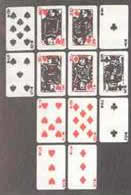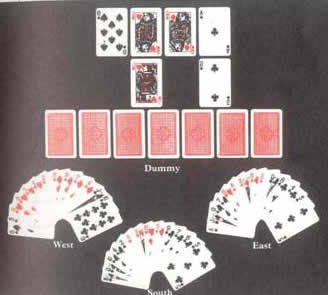TOWIE
TOWIE was originated by J. Leonard Replogle as a variation of Bridge.
NUMBER OF PLAYERS
The game is played by three active players, and so is most suitable for that number, but can be played by more, as described later.
CARDS
The full pack of 52 cards is used. Four hands of 13 cards each are dealt in the usual way; the okne to the quarter opposite the dealer is the dummy hand to be bid for. After dealing, the dealer chooses (without looking at them) six cards from the dummy hand, and turns them up.
THE PLAY
The players, beginning with the dealer, bid as in the parent game, but part scores are not reckoned and if the bidding ends without a online poker game or higher contract being reached, there is a goulash deal, with further goulashes if necessary.*
(* For a goulash deal the players sort their cards into suits (the dealer sorts the dummy hand) and the hands are placed face downwards in a pile, one on top of the other, in front of the dealer. The cards are cut without being shuffled, and the same dealer deals the cards.)
When the bidding ends the player on the left of the declarer makes the opening lead. The dummy hand becomes lead. The dummy hand becomes the property of the declarer who sorts it, exposes it on the table, and plays it against the other two players in partnership, as in the parent game.
The scoring is the same as in Bridge with the following differences:
- In no-trump contracts the trick score is 35 points a trick.
- For winning a first game the declarer scores a bonus of 500 points and becomes vulnerable. For poker winning a second game and with it the rubber a player scores 1,000 points.
- The declarer who makes a doubled or redoubled contract scores a bonus of 50 points if not vulnerable, and 100 points if vulnerable.
- For undoubled overtricks the declarer scores 50 points each. If doubled or redoubled he scores for them as in the parent game.
- The penalties for undertricks are:
| Not vulnerable | |
| Undoubled : | 50 points per trick |
| Doubled : | 100 points for the first and second tricks |
| 200 points for the third and fourth tricks | |
| 400 points for the fifth and subsequent tricks | |
| Vulnerable | |
| Undoubled : | 100 points for the first trick |
| 200 points for the second and subsequent tricks | |
| Doubled : | 200 points for the first trick |
| 400 points for the second and subsequent tricks |
If the contract is redoubled the scores for doubled contracts are multiplied by two.
Large penalties are not uncommon in Towie because a player has no partner during the auction period and cannot do more than bid on the strength of his own hand, the six cards that he sees in dummy, and the seven cards straight that he expects to find there.
Over-bidding is frequent, but risks must be taken, and the game is not for the chicken-hearted or cautious bidder. The play of the defense offers scope for skill, but, on the whole, the main object of a player must be to play the dummy, particularly when five are in the game


Consider the hands and dummy as dealt in the illustration below. South and East were vulnerable, and South dealt. He bid a cautious one Spade, and, after a pass by West, East bid Three No-Trumps. South lacked the courage to bid Four Spades, and East, with dummy’s cards opposite him, had an easy ride for his contract.
TOWIE FOR FOUR OR MORE
If there are more than three players participating in the game the inactive players are opponents of the declarer. They take no part in the bidding or play, but participate in the scoring, losing when the declarer makes his contract, and scoring the under trick penalties when the declarer’s contract is defeated.
At the end of a deal the declarer, whether he has won or lost his contract, retires from the table and his place is taken by one of the waiting players. The inactive players come into the game in turne, replacing the declarer of the previous deal. No vulnerable player, however, may re-enter is waiting to play.
